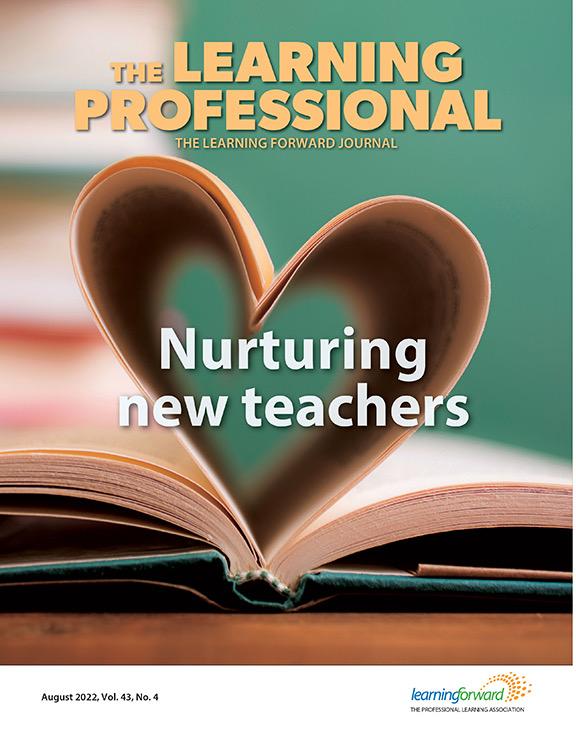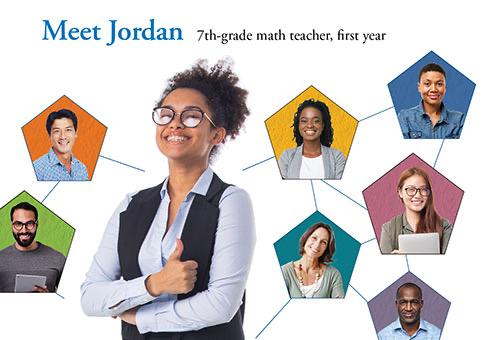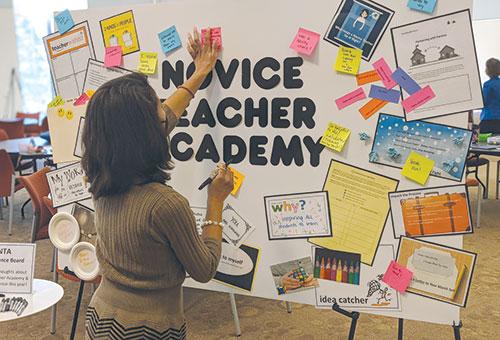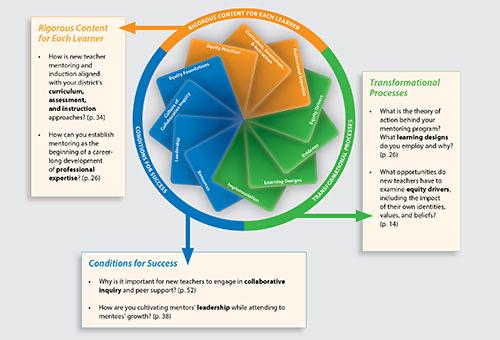
Nurturing new teachers
August 2022
New teachers have unique professional learning needs and challenges. When leaders address those needs, they start teachers on a path of ongoing career development. This issue examines how to build systems of support that provide new teachers what they need for their first years in the classroom and well beyond.
Read the remaining content with membership access. Join or log in below to continue.
Sed ut perspiciatis unde omnis iste natus error sit voluptatem accusantium doloremque laudantium, totam rem aperiam, eaque ipsa quae ab illo inventore veritatis et quasi architecto beatae vitae dicta sunt explicabo. Nemo enim ipsam voluptatem quia voluptas sit aspernatur aut odit aut fugit, sed quia consequuntur magni dolores eos qui ratione voluptatem sequi nesciunt. Neque porro quisquam est, qui dolorem ipsum quia dolor sit amet, consectetur, adipisci velit, sed quia non numquam eius modi tempora incidunt ut labore et dolore magnam aliquam quaerat voluptatem.
In This Issue
FOCUS
Don’t just prepare new teachers, nurture them
Too often, new teachers are expected to go it alone. We can do better.
To make a difference for every student, give every new teacher a mentor
Learning Forward’s mentoring approach helps all teachers develop the skills and habits to be instructional leaders.
A network of support for new teachers
Meet Jordan, a first year math teacher, and all the educators surrounding her to provide comprehensive support.
3 strategies to upgrade your mentoring program for new teachers
District and school leaders can use these strategies, along with reflection questions, to strengthen support for new teachers.
To support new teachers of color, build communities, not committees
Novice teachers of color in Wisconsin find support through a project that partners them with veteran teachers.
COVID-19 reshaped new teacher induction — for the better
Pandemic adaptations in Greece Central School District in New York have increased new teacher support and retention.
With grow-your-own programs, new teachers find job-embedded support
Miami-Dade County Public Schools tailors adult learning to each grow-your-own pathway to ensure emerging teachers are nurtured and supported.
For small districts, a regional network holds the key to new teacher support
The Novice Teacher Academy, a regional community of practice in Virginia, takes a collaborative approach to supporting new teachers from small districts.
ONLINE EXCLUSIVE: Do alternatively certified teachers need different supports?
The landscape of teacher preparation has changed, and so should onboarding and support for new teachers.
ONLINE EXCLUSIVE: New pathways to teaching break down barriers
A Colorado program encourages underrepresented high school students and staff to become teachers in the district.
ONLINE EXCLUSIVE: Mentors give new teachers a sense of belonging
Networked improvement communities build a culture of belonging and connection for new teachers.
TOOLS
Action steps for implementing Standards for Professional Learning
All educators can advocate for standards adoption and policy. Plan your next step with this tool.
Through the lens
How this issue’s articles can help you understand and apply the Standards for Professional Learning.
IDEAS
What do YOU need to learn from ME?
Tracey Tokuhama-Espinosa, a keynote speaker at this year’s Annual Conference, explains why she’s flipping the script.
Plan, but be prepared to pivot
Districts across the U.S. have learned lessons from the pandemic that we can all apply to accelerate learning going forward.
No principal is an island
Leaders need a solid base of support, and new reports demonstrate how partnerships provide it.
ONLINE EXCLUSIVE: 5 reasons we will always be educators
Veteran educators’ advice encourages teachers to stay for the long term.
RESEARCH
Study explores mentoring’s connection to new teacher retention
To keep teachers in the field, the content and frequency of mentoring interactions matter, recent studies show.
Data points
The latest on coaching cycles, feedback, instructionally-focused professional learning, and more.
VOICES







UPDATES
Recent Issues
NAVIGATING NEW ROLES
April 2025
Whether you’re new to your role or supporting others who are new, professional learning is essential for getting up to speed. This issue includes strategies and advice for a wide […]
LEARNING DESIGNS
February 2025
How we learn influences what we learn. This issue shares essential resources for creating, facilitating, and assessing high-quality professional learning.Read the remaining content with membership access. Join or log in […]
BUILDING BRIDGES
December 2024
Students benefit when educators bridge the continuum of professional learning between K-12 schools and other institutions. Read the remaining content with membership access. Join or log in below to continue. […]
CURRICULUM-BASED PROFESSIONAL LEARNING
October 2024
High-quality curriculum requires skilled educators to put it into practice. Professional learning can ensure instructional materials lead to excellent teaching and learning.Read the remaining content with membership access. Join or […]

























